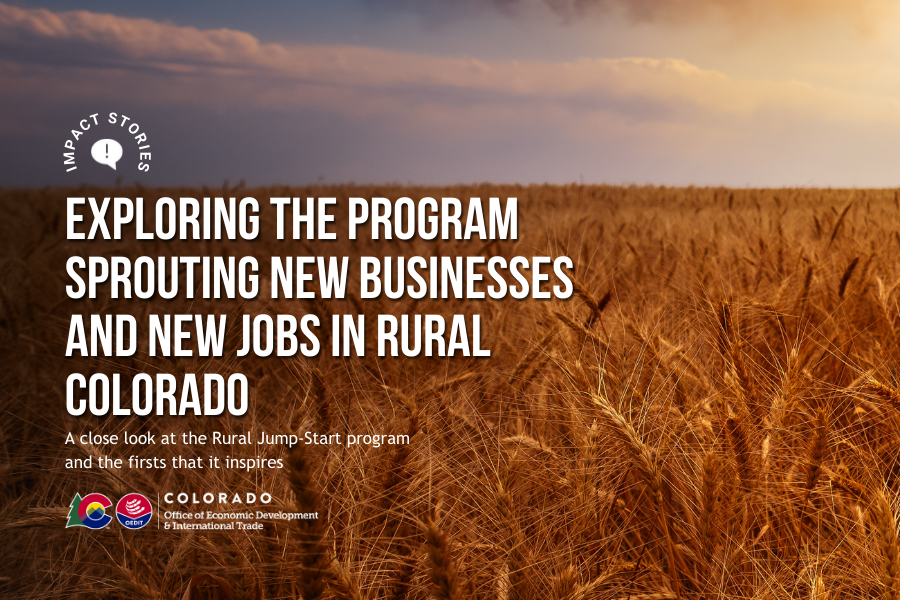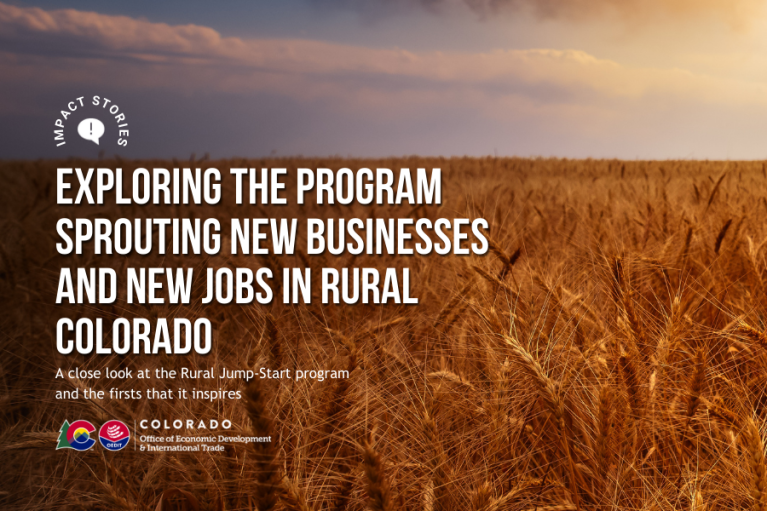
A close look at the Rural Jump-Start program and the firsts that it inspires
Adventurous entrepreneurs have discovered an unexplored program in the heart of Colorado that bolsters job growth and workforce development across the state. As early adopters and the first in their communities to join the Rural Jump-Start (RJS) program, these entrepreneurs are blazing a trail to create more jobs, training for employees, and build successful businesses.
The first of the firsts is in Kit Carson County, home to a population of 7,000 people and the town of Vona. There you’ll find CEAD (pronounced seed) Farms, a lovely place who’s acronym comes from the entrepreneurs' names. Since its origin, the farm grew from 600 to 7,000 acres. With the support of RJS, the owners of CEAD Farms were able to start an additional, new business venture, CEAD Farms Grain, which consists of upgrading Vona’s grain elevator to an organic flour mill.
“From the front door of the flour mill, you can see thousands of acres of crop fields. I find it fascinating that the wheat being grown right across the street is what we are using to make flour at our mill,” said Sean O’Dell, Operations Manager at CEAD Farms Grain. “If given a chance and some hard work, small businesses have the chance to thrive in Vona, just like anywhere else.”
That is the goal of RJS: to help entrepreneurs launch new businesses in rural counties of less than 250,000 people, with county-wide personal incomes below the state average and unemployment above the state average. Thirty-one counties have joined RJS to encourage local business development and connect entrepreneurs to the benefits available through this program.
“The immediate impacts we are seeing from the Rural Jump-Start grant money was in renovating the grain elevator,” said O’Dell. “It's very important to give people a reason to stop in Vona, and a reason we tried to create a very appealing facility, to make it a bright light in the community. Getting more eyeballs on the town of Vona is a huge positive.”
In addition to bringing visitors and growing businesses, RJS helps build relationships between community members, including local colleges and higher education institutions to help build the local workforce.
“I expect that in the long term we will be able to attract and educate college-aged kids on our business operations and hopefully, with the proper growth, be able to hire a bunch of students that have an interest in organic flour and other agricultural-based work opportunities,” said O’Dell.
South of Vona, on the historic Santa Fe trail, the community of Trinidad is also experiencing the benefits of the program. As the first RJS company in Las Animas County, which is home to around 8,300 people, Colorado Sun Tofu is a family-owned, veteran-owned, and women-owned business that also focuses on workforce development.
“Our business focus is related to workforce development, Colorado-based manufacturing, and exporting, which were all aligned with what the Rural Jump-Start program offered,” Lauren Roberts, co-owner of Colorado Sun Tofu.
Colorado Sun Tofu sells soy-based products including soy milk, tofu, and more and the family is also behind two legendary Denver restaurants City, O’City and Watercourse Foods. Basing a critical component of these food businesses in Trinidad has brought many benefits to the local community.
“We have formed a partnership with Trinidad State College, especially their business department. We aim to work with student entrepreneurs to help them develop their business acumen and thereby support the economy, and also recruit for our own hiring,” said Roberts.
“We are a community-focused organization, and being able to work with the city in a more meaningful way through this program, we feel that over time it will strengthen our business and relationship with Trinidad,” said Roberts. “We also found the application process fairly easy, and the folks at the state very helpful with guiding us through what we needed to complete the process.”
Building these types of community partnerships and providing inclusive access to RJS is at the foundation of the program. Rural Jump-Start program manager Morgan Vankat has visited at least 29 counties to see the program’s impacts firsthand and connect more counties to RJS.
“The impact of the Rural Jump-Start program can be transformative for companies and communities. It has been extremely rewarding to share this opportunity that benefits businesses, employees, and communities, and watch companies bring their dreams to life,” said Morgan Vankat, Rural Jump-Start program manager at the Colorado Office of Economic Development and International Trade (OEDIT).
Local economic development organizations (EDO) and institutes of higher education (IHE) also help connect businesses to the program, and participants often say that working with the program is easier than they expect. As one of the 28 companies participating in RJS and the first in Montezuma County, Higher Purpose Homes, a manufacturer of modular housing and panelized frames, has seen the benefits of working with local economic development organizations and the state.
“The Region 9 Economic Development District in Durango guided us to Rural Jump-Start and they have been involved in helping navigate hurdles we’ve experienced as a startup in the region. Their partnership has been so helpful,” said Ethan Deffenbaugh, co-founder of Higher Purpose Homes.
Building bridges between local and state governments to benefit businesses is at the core of RJS.
“When we were looking for funding we thought it would be impossible to get government funding. You just don’t think it will be easy to get that kind of help,” said Nick Lemmer, co-founder of Higher Purpose Homes. “The complete opposite is true. It’s way easier to work with OEDIT, Region 9, and anyone else involved than working to get private funding,” said Lemmer.
The program has also proven that when rural businesses, local EDOs, and the state work together, local growth happens, with 126 jobs created and retained in 2023 alone. Thanks to the program's success, Colorado legislators are working to see it renewed. In fact, it was the first bill in the 2024 legislative session, HB 24-1001. With so many firsts to highlight and so many more firsts to come, the Rural Jump-Start program is poised to elevate even more businesses, employees, and communities, empowering all to thrive in Colorado’s economy.
To learn more about Rural Jump-Start, please reach out to Morgan Vankat at morgan.vankat@state.co.us or reach out to your local economic development organization or institute of higher education.
